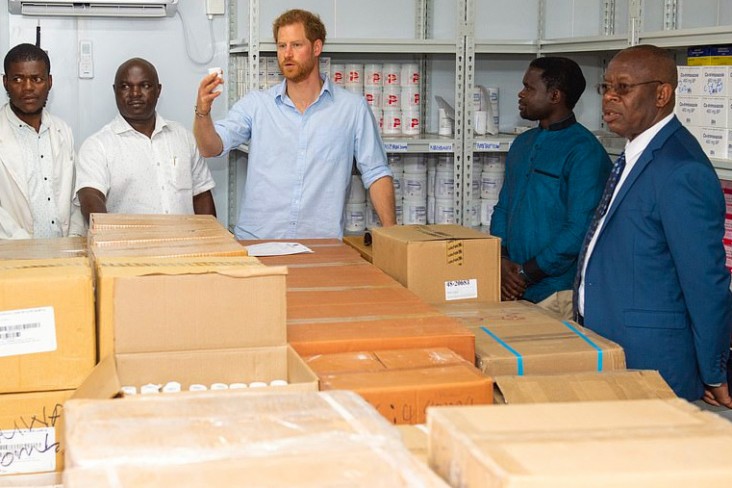Speeches Shim

HRH Prince Harry and Megan the Duchess of Sussex Tour Malawi - During their recent tour to southern Africa, the Duke and Duchess of Sussex spent time in Malawi where they engaged in a variety of field visits. Among the site visits, HRH Prince Harry visited a health clinic that is using one of USAID’s “pharmacy-in-a-box” storage facilities. A joint project between USAID and DFID, the project was launched in response to a Ministry of Health assessment that found that over 77 percent of Malawi’s health facilities lacked adequate storage space for health commodities. Over the course of the joint project, 115 units were installed in 2016, and then in 2018/19 an additional 238 units were installed, 117 of which are off-grid and solar powered. The project has revolutionized health commodity storage in Malawi with more than 10,000 m3 volume of space added and 2.4 megawatts of daily cumulative power from solar powered units generated to keep perishable commodities safe. The storage units have also helped to streamline and better-secure Malawi’s health commodities supply chain, thereby reducing waste and theft. During the visit Prince Harry spoke with clinic staff and patients, and received a thorough briefing on the pharmacy-in-a-box project.
U.S. Ambassador to Malawi Robert Scott Attends Conference to Accelerate Government of Malawi (GoM) Decentralization Process - Dr. Ben Phiri, who was installed as the Minister of Local Government after Malawi’s recent tripartite elections, called a conference in order to share his vision for the next stages of the devolution process and to exhort district officials to provide critical public services to Malawi’s citizens. Ambassador Scott, accompanied by USAID Democracy, Rights, and Governance staff, attended the conference to deliver remarks and to become fully briefed on the status of the decentralization process and USAID’s ongoing role in supporting the process. Malawi’s Constitution (1995) and Local Government Act (1998) recognize that local governments are best placed to deliver socioeconomic development due to their proximity to citizens. As such, Malawi’s Decentralization Policy provides for the devolution of political power, authority, and resources to local government to facilitate democratic governance and development. These reforms cover a range of areas including the devolution of human resources, payroll, public financial management, and performance management. USAID developed the Local Government Accountability and Performance (LGAP) activity to support implementation of these reforms with an initial investment of $24.9 million for a five-year program (2016 – 2021). In recognition of LGAP’s impressive performance to date, the UK Department for International Development (DFID) made an addition investment of $14.9 million in 2019 to enable the expansion of LGAP from eight districts to all of Malawi’s 28 districts.
Malawi Succeeds at Conference of Parties under the Convention on International Trade in Endangered Species of Wild Fauna and Flora (CITES) - In the just ended 18th CITES Conference of Parties, Malawi was delisted as a country of primary concern in recognition of its recent efforts to combat wildlife crimes -- such as approving a revised National Parks and Wildlife Act, which now has custodial coverage and stiffer sentences for wildlife crimes. In addition, the proposal of several Southern African states to delist the protected status of elephants in order to facilitate the legal trade of ivory products with Japan was unanimously rejected by the member states, including Malawi.
On the flora conservation front, Mulanje Cedar and African Rosewood (Mukula) trees, both indigenous to Malawi, were listed as becoming endangered species if their trade is not regulated. Mulanje Cedar is endemic to the Mulanje Mountains and grows naturally at altitudes above 1,800 meters above sea level. The recent National Report to the Convention on Biodiversity indicates the number of mature Cedar trees had been decimated and reduced to zero in 2019 from 38,000 in 2014 due to illegal logging. Malawi welcomes the conservation effort and will participate in efforts to re-establish and preserve both species.

Comment
Make a general inquiry or suggest an improvement.